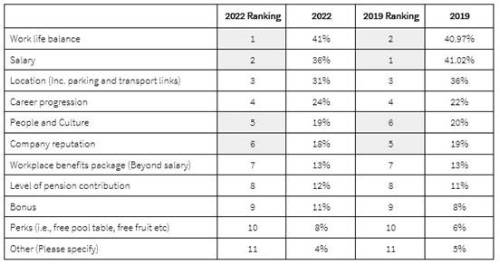New research published today by Aviva, one of the UK’s leading workplace pension providers, found more workers surveyed said they were attracted to their current role for the work-life balance (41%) than the salary (36%)1.
This is a switch in rankings compared to 2019, before the pandemic, when more workers said they were attracted to the salary (41.02%), closely followed by work-life balance in second place (40.97%)2.
Of those surveyed, more male employees still said they were attracted to salary (43%) over work-life balance (34%) compared to female employees who picked work-life balance (44%) over salary (33%).
The workplace benefits package and level of pension contribution on offer both remained consistent over the three years, once again ranking 7th and 8th place as reasons for taking a current role. Once again, ahead of bonus.
Almost 9 in 10 (88%) employees said workplace benefits – other than salary - improve their overall happiness. This is up slightly from 2019 (86%).
Table 1: What did employees say attracted them to their current role?

Laura Stewart-Smith, Head of Client Engagement at Aviva: “Before the pandemic, it would have been difficult to imagine a time when employees would pick a role for the work-life balance over the salary. The pandemic seems to have shone a light on the importance of being able to juggle family-life, exercise-life, dog-life – whatever the lifestyle – with work-life. Getting this balance right for employees and employers is a tricky one but if successfully achieved it can often mean a happier and more productive workplace.”
Improvements to workplace benefits packages
Nearly 9 in 10 employees (87%) said they want to see improvements to their workplace benefits package over the next 12 months, which is up slightly from 2019 (82%).
However, more than half (53%) of employers this year3 said they struggle to offer competitive workplace benefits to their employees, up by eleven percentage points from 2019 (42%)4. Nearly two thirds of SME employers (62%), sized between 50 and 249 employees, are finding it a challenge. As in 2019, the cost to implement the benefits was cited as the main reason (62%) why employers struggle to offer competitive workplace benefits.
Laura Stewart-Smith said: “The workplace benefits package on offer and the level of employer pension contributions are clearly both still important to employees in a post-pandemic world. However, it is a tough time right now and it’s understandable that employers might be feeling like they struggle to provide a competitive package.
“Given the economic challenges, making the most of what already exists is important. Employers can only get the best return on investment if employees fully understand and utilise the benefits available to them and key to achieving this is good engagement. It is important when communicating the workplace benefits package to be sensitive to the financial challenges people might be facing in the current climate and employee case studies of those who have benefitted may be a useful tool in bringing to life what a workplace benefits package can do for other colleagues.
“Employees may be able to help improve their situation by taking-up the benefits which are on offer. It might be a surprise to some what their employer has on offer – for example, financial education seminars, salary sacrifice, higher pension contributions, low-cost loans, or childcare vouchers.”
|

